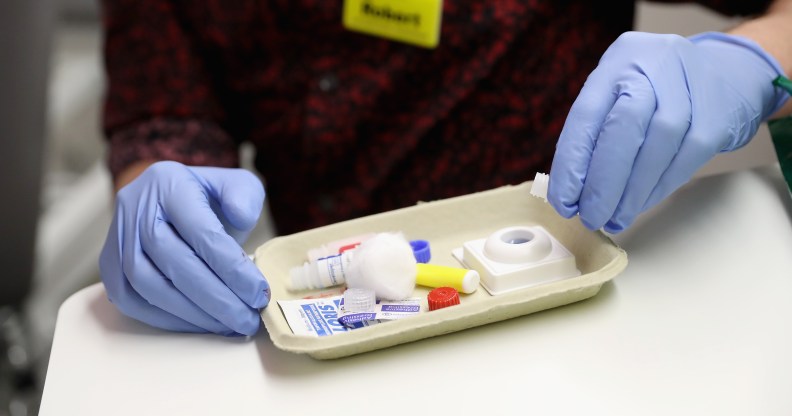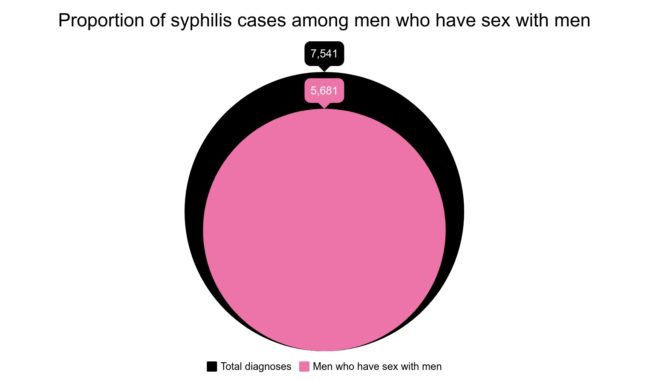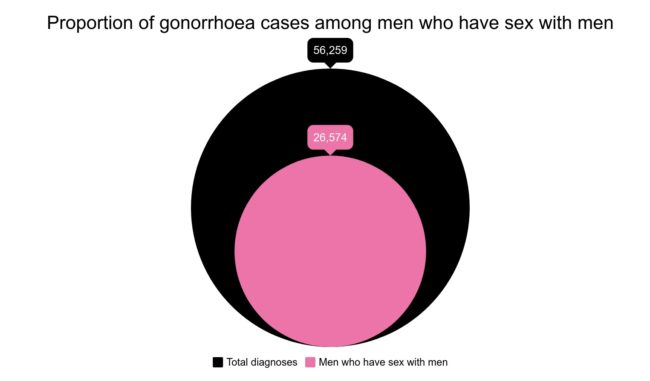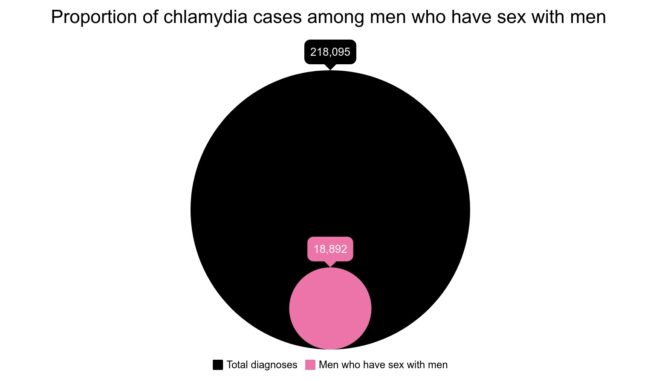Gonorrhoea and syphilis cases are surging among gay and bisexual men

(Chris Jackson/Getty)
Cases of gonorrhoea in England have reached a record high, with public health experts blaming Grindr and bareback anal sex for a surge in sexually transmitted infections among gay and bisexual men.
A report from Public Health England published on Tuesday (June 4) revealed that rates of gonorrhoea are the highest on record since 1978.
Gonorrhoea and syphilis are on the rise among men who have sex with men
The health body’s data for 2018 shows that gay and bisexual men now account for three-quarters of all syphilis diagnoses in England, and nearly half of all gonorrhoea diagnoses.
Cases of syphilis, gonorrhoea and chlamydia have all risen dramatically among men who have sex with men, up by 61 percent, 41 percent and 61 percent respectively compared to five years ago.
5,681 cases of syphilis were diagnosed among men who have sex with men in 2018, amounting to 75 percent of the total cases recorded.

Three-quarters of syphilis diagnoses are among men who have sex with men in 2018. (Chart: Nick Duffy)
Total cases of gonorrhoea have nearly tripled in the past decade, which Public Health England says is mostly driven by increases among men who have sex with men.
There were 26,574 cases of gonorrhoea among men who have sex with men in 2018, amounting to 47 percent of the 56,259 cases diagnosed.

26,574 cases of gonorrhoea were recorded among men who have sex with men in 2018 (Chart: Nick Duffy)
While diagnoses of gonorrhoea and syphilis are dominated by gay and bisexual men, the opposite is true of chlamydia, which is predominantly diagnosed among all other sexual orientations.
Chlamydia remains the most diagnosed STI overall, but men who have sex with men account for just 8 percent of cases.

Just one in 12 diagnoses of Chlamydia is among men who have sex with men
Public Health England notes that the increase may be “driven by behavioural changes” among men who have sex with men, including “an increase in partner numbers and condomless anal intercourse, as well as, for some high risk MSM, ‘chemsex’ and group sex facilitated by geosocial networking applications.”
The body notes that part of the increase could also be down to better testing practices.
Liz Porter of Terrence Higgins Trust told PinkNews: “These new statistics show that gay and bisexual men continue to be disproportionately impacted by STIs, in particular gonorrhoea which has increased by 24 percent in the last year alone.
“Attributing this directly to dating apps or changes in sexual practices is only speculative and more work needs to be done to investigated further.
“What the data does show is the urgent need for more targeted campaigns and interventions towards gay and bisexual men when it comes to sexual health.
“These stats also underline why it’s vital that new Relationships and Sex Education lessons have a strong emphasis on sexual health so everyone – including young LGBT+ people – have the information they need to access services and take control of their sexual health.”
Sexual health funding cuts have ‘dire impact’
Debbie Laycock of Terrence Higgins Trust added that the data comes “against a back drop of central government stripping £700 million from public health budgets in the last five years.”
She said: “Today’s STI statistics [demonstrate] very clearly the dire impact on sexual health that decisions being made by central government are having.
“Ministers need to wake up to this crisis and take decisive action.”
— Debbie Laycock, Head of Policy and Public Affairs at Terrence Higgins Trust
“Ministers need to wake up to this crisis and take decisive action. Their handling of sexual health to date is simply not good enough.”
Laycock continued: “The government cannot bury its head any longer, the consequences of under-investment and services struggling to meet demand is plain to see with these STI numbers.
“There is now a real risk to widening health inequalities already faced by certain groups. These groups – including BAME communities, young people, people living with HIV and gay and bisexual men – are once again disproportionally affected by new STI rates.”
Despite the rise in other sexually transmitted infections, HIV diagnoses among gay and bisexual men in the UK have plummeted in recent years.

